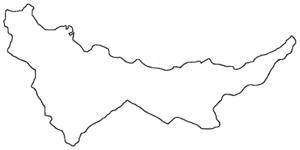
|
The Society of Folk Dance Historians (SFDH) Pontos
[
Home |
About |
Encyclopedia | CLICK IMAGE TO ENLARGE |

|
BACKGROUND
Information: A region.
Pontos (Pontus) is a region on the southern coast of the Black Sea, located in modern-day eastern Black Sea Region of Anatolia, Turkey. The name was applied to the coastal region and its mountainous hinterland (rising to the Pontic Alps in the east) by the Greeks who colonized the area since the Archaic period and derived the name from the Greek word for the Black Sea. The Greeks have lived there for over 2500 years.
By the 6th century BCE, Pontus had become officially a part of the Achaemenid Empire, which probably meant that the local Greek colonies were paying tribute to the Persians.
In 960 CE, the Arabs were expelled from Crete by the Byzantine forces of Nicephorus II and Pontians were settled there to restore the Greek Orthodox faith and the language. Villages still bear Pontian names and the dances and music of Crete and Pontos have many similarities. Most Pontians settled in Macedonia near Thessaloniki, after the population exchange. Every August 15th, they gather at Kastana, Veria, to honor the icon of Panayia Soumela brought from its old site in Pontos.
Under the Ottoman rule which began with the fall of Trebizond, particularly starting from the 17th century, some of the region's Pontic Greeks became Muslim through the Devşirme system. But at the same time some valleys inhabited by Greeks converted voluntarily, most notably those in the Of valley. Large communities of Christian Pontic Greeks remained throughout the area (including Trabezon and Kars in northeastern Turkey – the Russian Caucasus) until the 1920s, and in parts of Georgia and Armenia until the 1990s, preserving their own customs and dialect of Greek.
Most Common Dance: Tik
Language: Pontic Greek
Religion: Christianity
DOCUMENTS
- Dances of Pontos, Greece, an article.
- Greece, a country.
- Kots, a dance.
- Pontic Music and Dance, an article
This page © 2018 by Ron Houston.
Please do not copy any part of this page without including this copyright notice.
Please do not copy small portions out of context.
Please do not copy large portions without permission from Ron Houston.